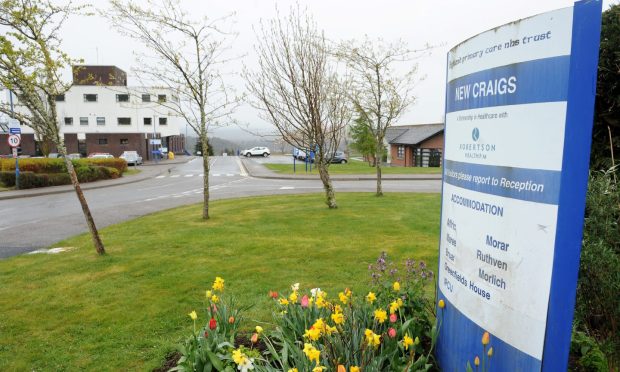A report has found a number of problems at New Craigs Hospital in Inverness.
Members of the Mental Welfare Commission unannouncedly visited two wards at the psychiatric hospital on Leachkin Road between July and August.
A report published today has revealed that New Craigs follows a “good practice” and provides “good standard care.”
However, the commission visitors also identified a number of issues the hospital needs to address.
They found that water was not safe to drink in one of the wards, with patients and staff having to drink bottled water.
Meanwhile, they highlighted two main issues in the ward housing people with complex functional mental illnesses and early-stage dementia.
The report states that some medication is being given out without the appropriate paperwork.
It also says that equipment such as showers and lighting controls are not suitable for these individuals.
Non-drinking water at New Craigs Hospital ward
Mental Welfare Commission members visited the Bruar Ward, an eight-bedded, mixed-sex, locked rehabilitation unit for individuals, on August 27.
Some of the patients at this unit may have come to psychiatric services through contact via a forensic route.
Although commission visitors said the bedrooms appeared “homely”, they revealed the temperature of the ward was mentioned as a problem, with windows unable to be opened in the hot weather.
Meanwhile, staff admitted there was ongoing surveillance of the water system, meaning that patients and workers were having to drink bottled water.
A recommendation issued by the Commission reads: “Managers should ensure that every effort is made to complete the water surveillance as quickly as possible.”
Despite the issues found, commissioners found out that a “good standard” of care is being provided at the ward.
The report reads: “All of those that we spoke with had positive things to say about staff.
“Comments such as” non-judgemental”, “helpful” and “sound” were mentioned.
“During this visit, we found a good standard of recovery-focused care being delivered to individuals with varying and complex needs.”
‘Issues of concern’ found at Inverness New Craigs
Two commission visitors attended the Morlich Ward of the psychiatric hospital on July 23.
This a 12-bedded, mixed-sex unit providing inpatient hospital care for older adults experiencing complex functional mental illness and early-stage dementia.
A number of “issues of concern with the environment” were identified.
The report states there were no manual or hydraulic hoists to help nurses to support individuals who required assistance with bathing.
There were also only overhead showers in the en-suite bathrooms, which may present a challenge for individuals who need assistance.
The report says hose-type fitting would be “more appropriate.”
Meanwhile, the lighting controls in the bedrooms were described as “overly complicated” for patients in the ward.
The Commission has issued a recommendation to tackle these equipment issues.
It reads: “Managers should arrange to provide the necessary equipment and make alterations to ensure the environment is suitable for older adults.”
Prescribed medications not ‘legally authorised’
The Commission also highlighted some medicines were given out without the required legal paperwork.
It revealed that some T3 certificates, which are used for authorising medical treatment where a person does not or cannot consent to treatment for a mental disorder, were not “legally compliant.”
The report reads: “We found that all T3s had been completed by the responsible medical officer to record non-consent; they were available and up-to-date.
“However, not all were legally compliant, with medications prescribed but not authorised on the forms.”
“More work needs to be done to ensure forms are legally compliant and could be improved by following the good practice found elsewhere in the service.”
An NHS Highlands spokesperson said: “NHS Highland is working with Robertsons to create a patient environment in New Craigs that is as safe as possible for vulnerable people.”


Conversation